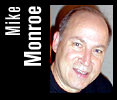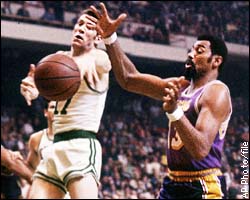
| Thursday, December 30
By Mike Monroe
Special to ESPN.com |
|
Everyone seems to have a millennium list, even though the new
millennium won't arrive for another year.
|  | | Wilt was on the Lakers' record-setting team back in 1972. |
Who am I to buck the tide, whether it is calling 2000 the first year of
the 21st century or having an end-of-the-century list?
Therefore, in honor of the first four-digit year that begins with a
two, I present, forthwith, my list of the 10 most important events in
the history of the NBA's Western Conference.
As usual with Top 10 Lists, I shall put them in reverse order.
(Apologies to D. Letterman)
And apologies to anyone who believes my list is top-heavy with Lakers
achievements and events. Facts are facts: The Lakers have won 11 NBA
titles.
10. The Utah Jazz drafts two relatively obscure players in the first
rounds of the 1984 and 1985 drafts.
Utah makes point guard John Stockton, of Gonzaga, the 16th overall pick
of the 1984 draft; it makes Karl Malone, of Louisiana Tech, the 13th
overall pick, of the 1985 draft.
The rest is history. Stockton merely has become the NBA's all-time
assists leader and Malone has re-defined the power forward position.
Both will be first-ballot Hall of Famers. During their time together in
Utah, the Jazz has been one of the best teams in the Western Conference,
winning back-to-back conference titles in 1997 and 1998.
Utah was the
only Western team to truly give the Michael Jordan Bulls a major challenge in the six NBA Finals in which Jordan played in the 1990s, and
it took Jordan's career-ending heroics to win Game 6 in 1998 to prevent
a Game 7 at Delta Center. And who knows how that one would've turned
out?
9. The NBA in 1976 amalgamates four ABA teams into the NBA, with the
Denver Nuggets and San Antonio Spurs ultimately landing in the West.
(The Spurs initially had to play in the Eastern Conference, which made
zero sense, but satisfied some sort of competitive balance for the newly
expanded league.)
The Nuggets immediately established that the ABA teams are not to be
taken lightly, winning the Midwest Division and selling out every game
at McNichols Arena. When the Spurs eventually got back in the Western
Conference, they, too, were more than merely competitive. Ultimately,
they will win the last championship in any year that begins with 19.
And on April 9, 1978, the NBA scoring race comes down between Denver's
David Thompson and San Antonio's George Gervin in the final game of the
season. Thompson scores 73 in an afternoon game in Detroit to take a
lead over Gervin, but "Ice" scored 64 later that night in New Orleans to
win the title. Thompson's 73 is merely the second-highest non-overtime
game total in NBA history, and you know what No. 1 was.
8. The Portland Trail Blazers win the 1977 NBA title.
Led by Bill Walton in his one truly injury-free season, the Trail
Blazers beat the Philadelphia 76ers, and Julius Erving, four games to
two, in The Finals. Walton's performance in title-clinching Game 6 is
one of the most dominating in NBA Finals history: 20 points, 23
rebounds, 7 assists and 8 blocked shots.
7. The Lakers draft Magic Johnson in 1979.
After leading his Michigan State team to an NCAA title in a dramatic
win over Larry Bird's Indiana State team in a championship game that
riveted the nation, Johnson lands in L.A. to begin a run that will not
end before he helps the Lakers win five titles in his 13 seasons. Before
he retires, for good, in 1996, Johnson will set the NBA record (since
broken by Stockton) for assists (10,141) and score 17,707 points
One of his most dramatic career moments comes in his rookie season,
when he fills in at center for ailing Kareem Abdul-Jabbar and leads the
Lakers to a win in title-clinching Game 6 of the 1980 NBA Finals against Erving and the 76ers.
6. The Houston Rockets win back-to-back NBA titles in 1994 and 1995.
While some may denigrate these two titles because Michael Jordan
retired, temporarily, after leading the Bulls to a third straight
championship in 1993, the Rockets were more than worthy champions, as
their 4-0 dismantling of the Orlando Magic in the 1995 NBA Finals
clearly showed.
Don't forget: Hakeem Olajuwon was the first player selected in the 1984
draft, not Jordan, and this time you can actually state a case that
the Rockets made the right choice. In Jordan's absence Olajuwon clearly
was the game's most dominating player, the most skilled and athletic big
man in the game. He overcame Patrick Ewing in the 1994 Finals and toyed
with Shaquille O'Neal in the 1995 Finals.
5. The Lakers trade for Kareem Abdul-Jabbar.
What were the Milwaukee Bucks thinking? After leading them to the 1971
NBA title, Abdul-Jabbar played another four seasons in Milwaukee before
the Bucks shopped him (and Walt Wesley) to the Lakers for Elmore Smith,
Brian Winters, Dave Meyers and Junior Bridgeman.
All you need to know about that deal is that the Lakers won five titles
with teams for which Abdul-Jabbar played and the Bucks never again even
made it to The Finals.
Abdul-Jabbar and Magic Johnson were the centerpieces of the Lakers'
"Showtime" attack under Pat Riley as Los Angeles and Boston dominated
the 1980s.
Before retiring after the 1988-89 season, of course, Abdul-Jabbar would
become basketball's all-time leading scorer, with 38,387 points, and
all-time leading rebounder, with 7,161.
4. The Lakers win five titles in the 1980s.
Starting with the 1980 championship, in Magic Johnson's rookie season,
the Lakers dominate the Western Conference for an entire decade, winning
all but two of the 10 conference titles in the decade. They were so
dominant in beating the Celtics, four games to two, in The 1987
Finals, that coach Pat Riley guaranteed they would repeat as champions
the next season. And the Lakers delivered, beating the Detroit Pistons,
four games to three, in The 1988 Finals.
3. The Minneapolis Lakers go West in 1960.
You can argue that the Lakers already were West of the Mississippi, or
that the St. Louis Hawks, were, too. Personally, I don't think any city
that actually touches the Mississippi is on either side of the river.
What was significant about this move, of course, was that it established
the NBA on the West Coast, just as the Dodgers' and Giants' moves from
Brooklyn and New York had established Major League Baseball there. The
fact the Lakers would win six titles after heading West would help to
solidify the conference. Their presence in what would become one of
America's two media capitals was just as significant, and when the
Jabbar-Magic Lakers established "Showtime" as the
standard by which basketball excitement was measured, the West was
forever identified with the most compelling brand of basketball.
2. The Portland Trail Blazers draft Sam Bowie, instead of Michael
Jordan, in the 1984 draft.
You might argue that a "negative" accomplishment should not be ranked
as the second-most significant event in conference history, but consider
how the course of the NBA would have changed had Jordan played his
entire career in Portland, instead of Chicago. Jordan not only is the
greatest player in the history of the sport, but the greatest team
player, capable of taking any team to title after title.
The Blazers followed conventional wisdom that dictated you take a big
man over a smaller player when everything else is equal. Bowie, of
course, had a star-crossed, injury-plagued career. And in hindsight it
is abundantly clear that everything else was hardly equal.
1. The Lakers win the 1972 title after going 69-13 in the regular
season.
I was sorely tempted to rank the Blazers' drafting of Bowie, instead of
Jordan, as the No. 1 event in conference history, but that seemed a
little too speculative to be No. 1. Instead, I choose this amazing
accomplishment, by a team that some believe was the NBA's best ever.
This Lakers team, coached by one of the great basketball minds of all
time, Bill Sharman, merely had two of the greatest players ever, Wilt
Chamberlain and Jerry West, neither of whom was the team's leading
scorer. That was Gail Goodrich, who averaged 25.9.
What this team accomplished during the course of its run to a regular
season record that stood as the NBA's all-time best for 24 years was
astounding, winning 33 games in a row. That may be the sport's most
unassailable record. They also won 16 consecutive road games.
Was this team better than the 72-10 Chicago Bulls of 1995-96?
We never will know, but this list is all about opinion.
My opinion: Absolutely.
Mike Monroe, who covers the NBA for the Denver Post, writes a Western Conference column for ESPN.com. You can e-mail him at monroe128@go.com |  |

 Aldridge: Best of the Millennium
Aldridge: Best of the Millennium NBA West: Sizing up the West so far
NBA West: Sizing up the West so far NBA West: Charles, the other side
NBA West: Charles, the other side NBA West: No joke, Nuggets are legit
NBA West: No joke, Nuggets are legit
